The Ultimate Guide To Wild Camping In Scotland
Wild camping in Scotland is one of the best perks of this country for outdoor enthusiasts. If you have a tent, some basic gear and a little know-how, you can spend some quality time exploring the Scottish wilderness. We recommend combining wild camping with activities like hiking, kayaking & canoeing (and canoeing Scotland is a must-do by the way!)
The camping laws in Scotland allow you to pitch your tent on any uninhabited land and legally camp there for the night. This is the basic idea behind wild camping, although there are a few considerations and guidelines you’ll need to follow when doing it.
So, if you’re interested in connecting with Scotland’s nature and enjoying some free camping opportunities, then you’ll definitely want to go wild camping. This guide will explain everything you need to know to do this.
Can You Wild Camp in Scotland?
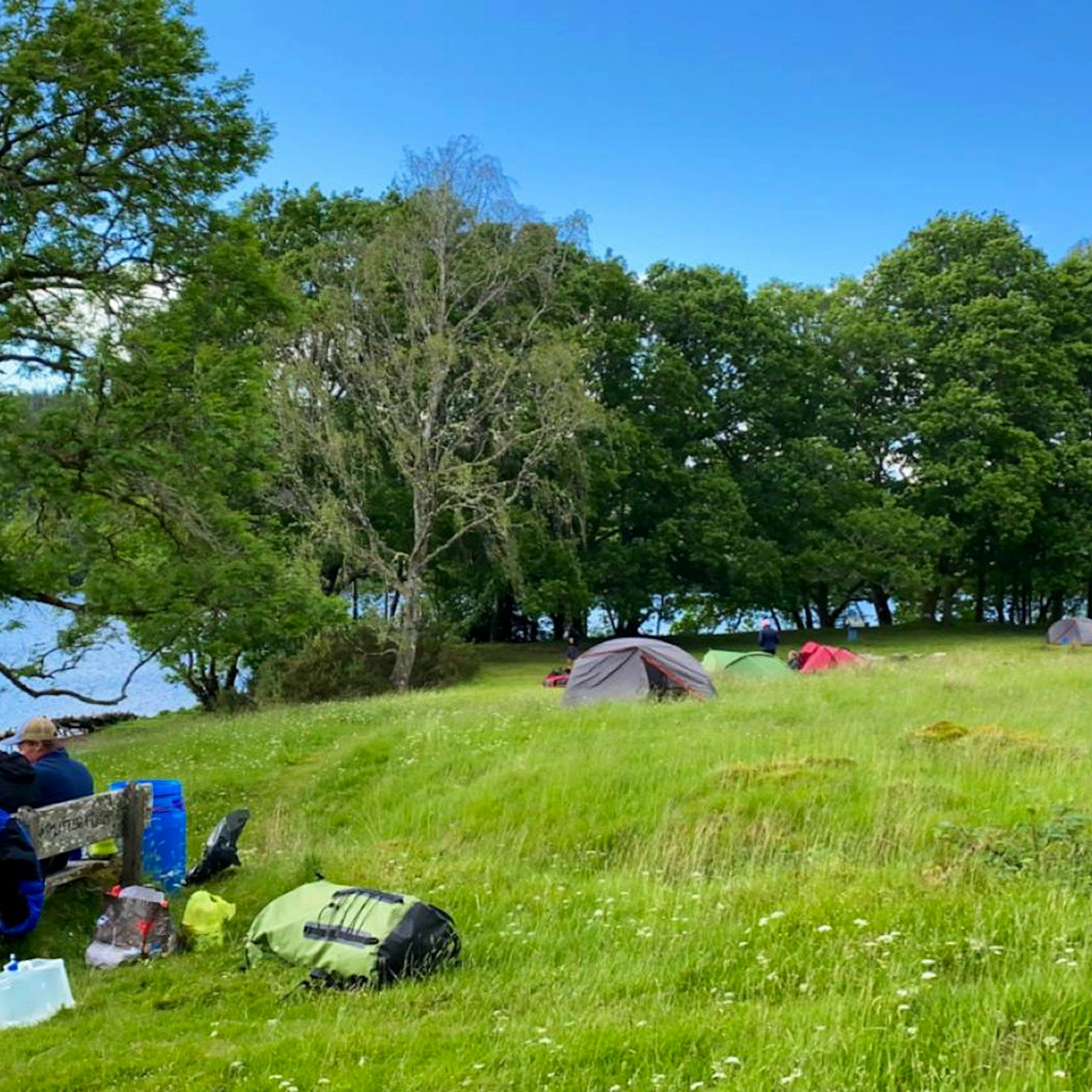
Yes, wild camping is legal in Scotland under the Land Reform (Scotland) Act 2003, which allows camping on most unenclosed land.
However, it's important to follow the Scottish Outdoor Access Code, which includes guidelines on responsible behaviour and respecting the environment. Camping in established campsites is also an option for those who prefer more amenities and facilities.
So, can you camp anywhere in Scotland? Not quite.
The Scotland camping laws have some rules in place for what kind of land is suitable for wild camping, or Scotland's right to roam camping. However, the short answer is that you can go wild camping in Scotland in most wilderness environments.
Scotland Wild Camping Rules
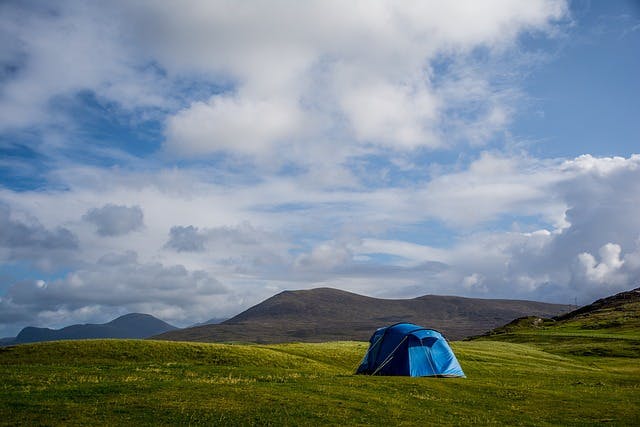
Scotland wild camping offers amazing opportunities for outdoor enthusiasts, like exploring the best Scotland hikes. However, it’s important that you follow the wild camping rules in Scotland to make sure you do it properly.
Here’s what you need to know about wild camping in Scotland.
Respect the Scottish Outdoor Access Code
When engaging in wild camping in Scotland, it’s essential to adhere to the principles outlined in the Scottish Outdoor Access Code.
This code serves as a comprehensive guide for responsible behaviour when camping in the wild. It underscores the importance of respecting nature, fellow land users, and the environment.
Following this code is not only a legal requirement but also a means to foster a harmonious coexistence between outdoor enthusiasts and the natural world.
Camp on Unenclosed Land
Wild campers in Scotland are granted the privilege of camping on most unenclosed land. However, it's crucial to understand the distinction between unenclosed land and cultivated fields or enclosed areas.
While unenclosed land is generally open to camping, cultivated fields and enclosed spaces are off-limits. In cases where you intend to camp on land that falls outside the unenclosed category, it’s essential to seek the landowner's permission. Adhering to these boundaries is vital for preserving the integrity of Scotland's diverse landscapes.
Leave No Trace
The "leave no trace" principle is a cornerstone of responsible wild camping.
To minimize your ecological footprint, you need to camp at least 200 feet away from roads and leave absolutely no trace of your presence behind. This means diligently packing out all litter, including food scraps and packaging, and properly disposing of waste.
By following this practice, you contribute to the preservation of Scotland's pristine natural beauty and protect the habitats of its indigenous wildlife.
Stay No Longer Than 3 Nights
While wild camping offers the opportunity for an intimate connection with nature, it is advisable to limit your stay to one location. The guideline suggests not staying longer than three nights in a single spot.
If you are on a multiday hike or canoe across Scotland trip this is no problem. You will likely be changing location every day anyway as you move from across the country.
By adhering to this recommendation, you reduce your impact on the local environment. Regularly changing your camping location helps to distribute the ecological load, preventing overuse of a particular area and ensuring that the wilderness remains accessible to all.
Use a Lightweight Stove

One of the fundamental rules of wild camping in Scotland is the prohibition of open fires. Instead, campers are encouraged to use lightweight camping stoves for cooking purposes.
This restriction is in place to safeguard the environment from the risks associated with open flames and to preserve the natural landscape.
By embracing modern, eco-friendly cooking methods, wild campers play an active role in minimizing their impact and contributing to the longevity of Scotland's wild spaces.
Respect Wildlife

While camping in the Scottish wilderness, it is vital to demonstrate the utmost respect for the indigenous wildlife.
This entails maintaining a safe distance from animals and refraining from any actions that could disturb them or their habitats.
Wildlife encounters are a cherished aspect of wild camping, and responsible behaviour ensures that these experiences remain positive for both humans and the local fauna.
Take Care of Toileting
Proper waste disposal is a non-negotiable element of responsible wild camping in Scotland.
To address human waste, it’s recommended to use a trowel to bury it at least 15 centimetres deep and a minimum of 30 meters away from water sources. This meticulous approach to toileting serves to protect the purity of Scotland's waterways and prevents contamination that could be harmful to both the environment and human health.
Keep Noise Levels Down
An often-overlooked aspect of wild camping etiquette is the necessity of keeping noise levels to a minimum.
Respecting the tranquillity of the wilderness is essential for the well-being of fellow campers and the preservation of the natural environment. The calming sounds of nature are an integral part of the wild camping experience, and observing quiet hours ensures that everyone can appreciate the serenity of the great outdoors.
Camping in Larger Groups
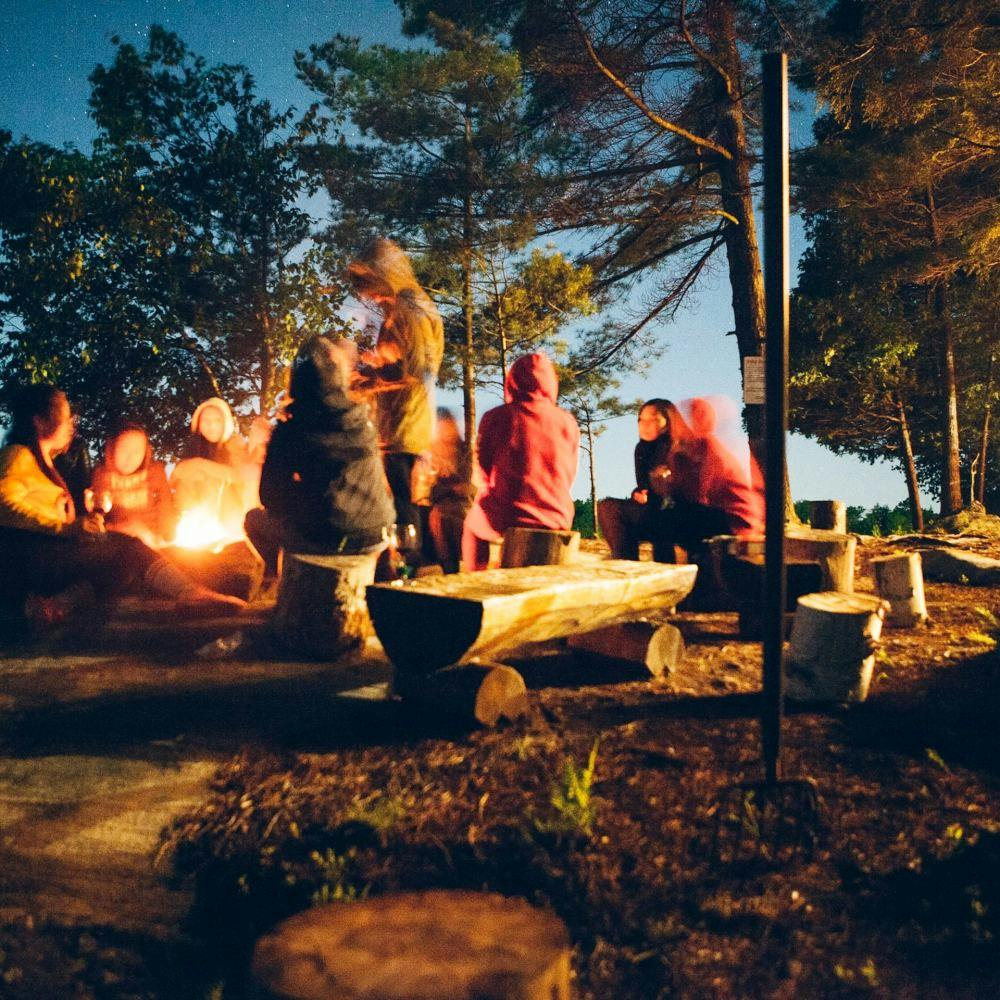
If you plan to camp with a larger group, typically consisting of four or more individuals, it’s a good idea to seek local authority permission.
This step helps manage the impact of large gatherings on the environment and ensures that your camping experience is both enjoyable and respectful of the surroundings. Obtaining proper authorization for group camping is a sign of responsible and considerate outdoor engagement.
Best Wild Camping Spots Scotland
Now that you know the rules for camping in Scotland, it’s time to decide on the best camping spots in Scotland.
From loch camping in Scotland to camping in the mountains, there are endless opportunities for amazing outdoor experiences. To help you plan your trip here are some of the most beautiful natural places for camping in Scotland.
The Isle of Skye
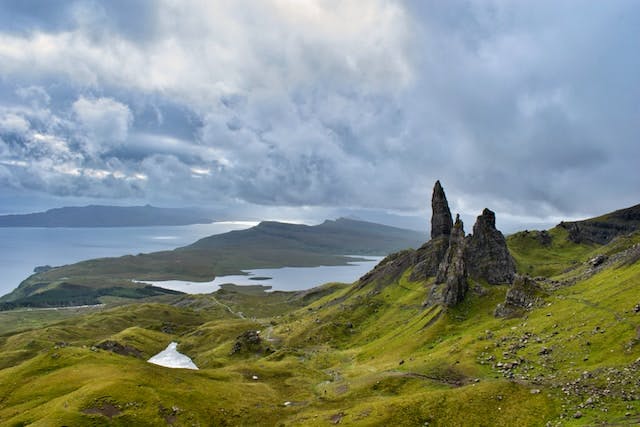
Consider camping on the shores of Loch Coruisk, accessible via a boat ride or a challenging hike from Elgol. Here, you'll be surrounded by the rugged Black Cuillin Mountains.
Expect breathtaking views, but also be prepared for changeable weather. Ensure you have proper waterproof gear and a good understanding of navigation since Skye's weather can be unpredictable.
This region is one of the best camping spots in Scotland thanks to its diverse landscape and remote feel. Needless to say, it’s one of the best wild camping areas in Scotland if you’re looking for peace and tranquillity.
Loch Lomond and The Trossachs National Park
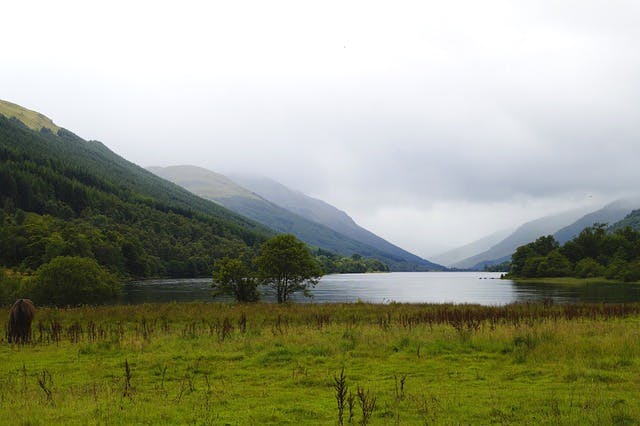
Loch Lomond, Scotland's largest freshwater loch, is a popular spot for wild camping. This is also a popular destination for Scotland loch canoeing
The eastern shores offer excellent camping opportunities, especially around Rowardennan. This is one of the most popular spots for camping on the loch.
Be mindful of the "Your Park" bylaws that limit camping in certain areas to permit holders during the peak summer months. Plan ahead, book permits if necessary, and respect the environment by following Leave No Trace principles.
If you’re looking for car camping spots in Scotland, then Loch Lomond’s shores also offer some amazing opportunities.

Latest Deals
Cairngorms National Park
The Cairngorms, home to ancient Caledonian forests and high plateaus, are a haven for outdoor enthusiasts.
Try wild camping in the Rothiemurchus Forest, which is part of the Cairngorms. Ensure you're aware of seasonal restrictions, and remember that camping permits may be required in certain areas during busy periods. Familiarize yourself with local regulations to camp responsibly.
Glencoe
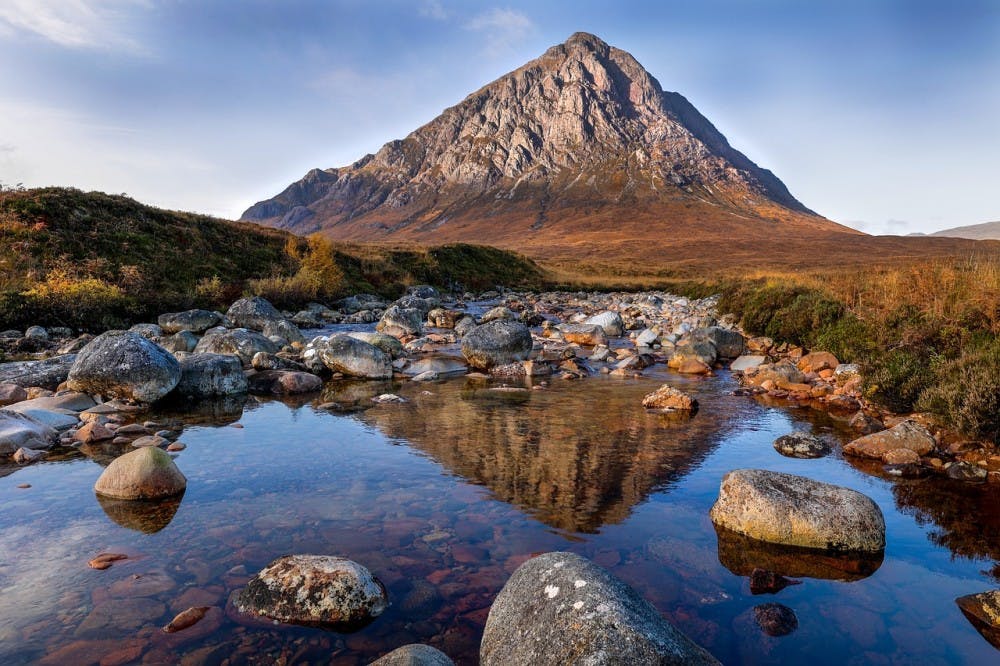
The glen is renowned for its dramatic scenery, with the Lost Valley being a popular camping destination.
Be prepared for ever-changing weather conditions in this part of the Scottish Highlands. Ensure you have sturdy, waterproof gear and the skills to navigate steep terrain. Respect the environment and other campers by following Leave No Trace principles.
If you’re interested in hiking or canoeing in Scotland, then this is a premier destination for these activities. Of course, you can combine them with wild camping for added fun.
The West Highland Way
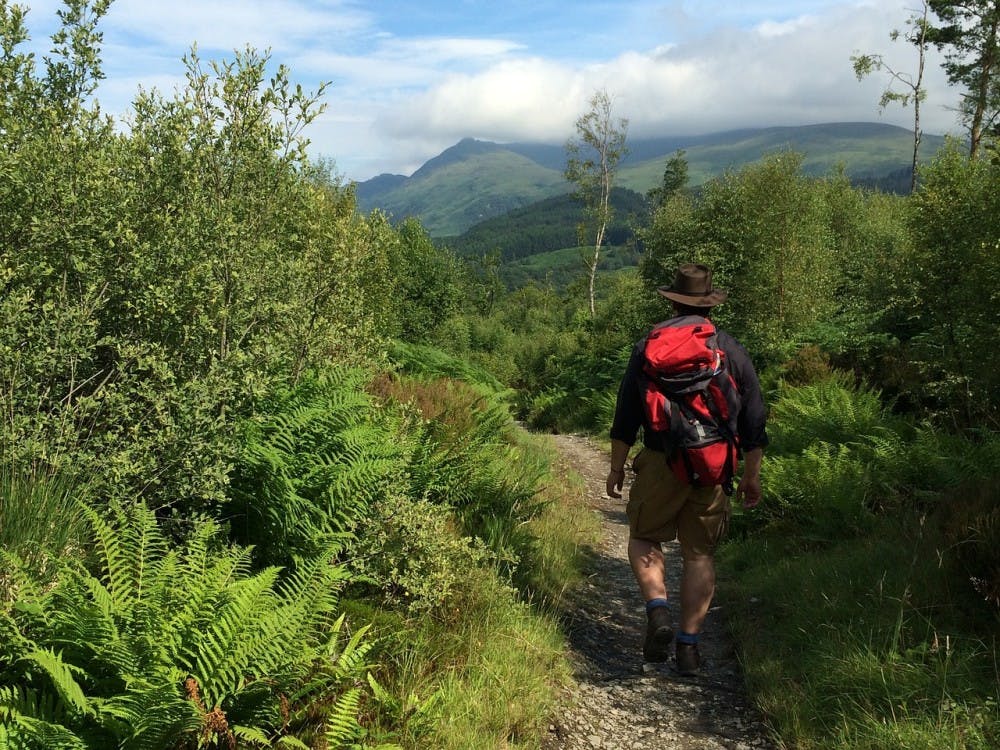
The West Highland Way, a long-distance hiking trail, offers numerous wild camping spots along its route.
The eastern shores of Loch Lomond and Rannoch Moor provide excellent camping opportunities. Be aware of camping permits for lochside areas during peak seasons. Plan your trip well in advance and consider camping stoves since open fires are not permitted.
Isle of Arran
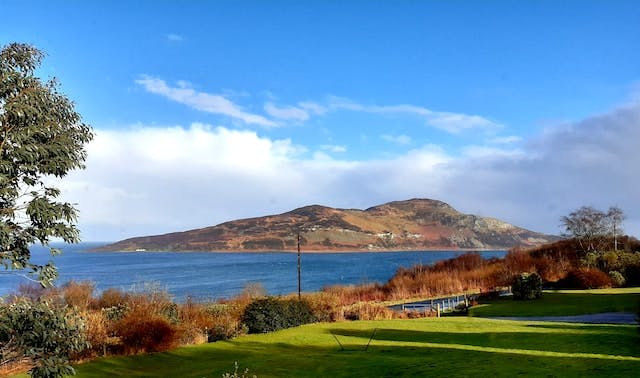
Known as "Scotland in Miniature," Arran offers diverse landscapes. Glen Rosa, located on the southern side of the island, is a popular spot for wild camping.
Expect stunning views of the Glen Rosa hills and surrounding mountains. Ensure you have appropriate gear for various weather conditions, as the climate can change rapidly. Bury waste properly, as there may be fewer facilities on remote islands.
If you want to go wild camping in Scotland in one of the more remote areas, then this is a great destination.
The Outer Hebrides
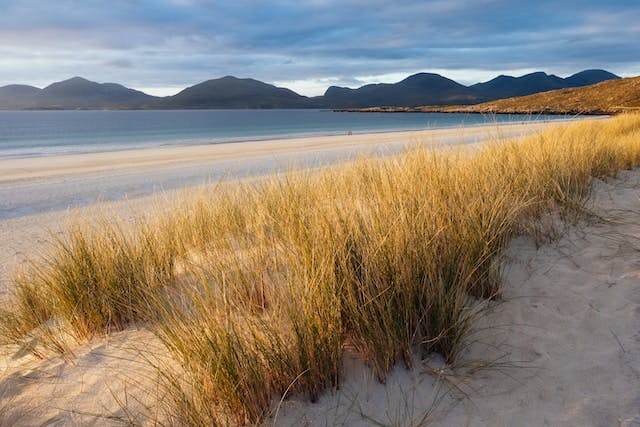
The Outer Hebrides, including the Isle of Harris, are remote and pristine. Wild campers can choose from numerous spots along the coast. Beaches like Luskentyre and Seilebost are particularly picturesque.
Be prepared for windy and wet conditions, and ensure your camping equipment can handle the elements. Be respectful of local communities and wildlife in these isolated areas.
Loch Ness
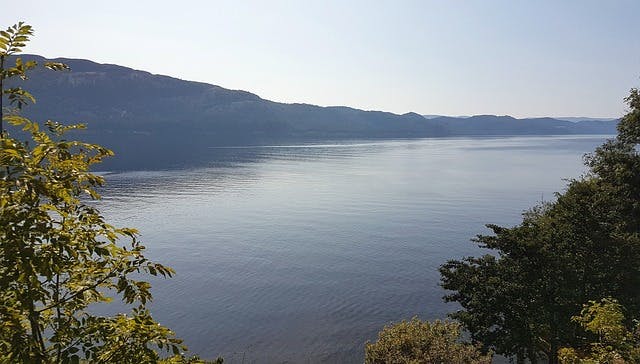
While Loch Ness is famous for its mythical monster, the hills and forests surrounding it are perfect for wild camping.
Dores Beach and Invermoriston are recommended spots. Expect stunning Loch Ness views, but also prepare for midges during the summer months. Use midge repellent, and camp away from the water's edge to minimize insect encounters.
The Great Glen Way
The Great Glen Way, stretching from Fort William to Inverness, offers a mix of camping opportunities. Loch Lochy and Loch Oich provide beautiful waterside locations. Be aware of camping restrictions in some areas and check for permits when needed. Respect local wildlife and consider camping stoves for cooking.
The Borders
The Scottish Borders offer a quieter, lesser-known wild camping experience. Campers can explore areas near St. Mary's Loch or the Southern Upland Way for a peaceful escape.
Expect tranquillity and solitude in these off-the-beaten-path locations, but also be mindful of limited facilities. Ensure you have adequate supplies and know the local regulations.
Tips for Wild Camping Scotland
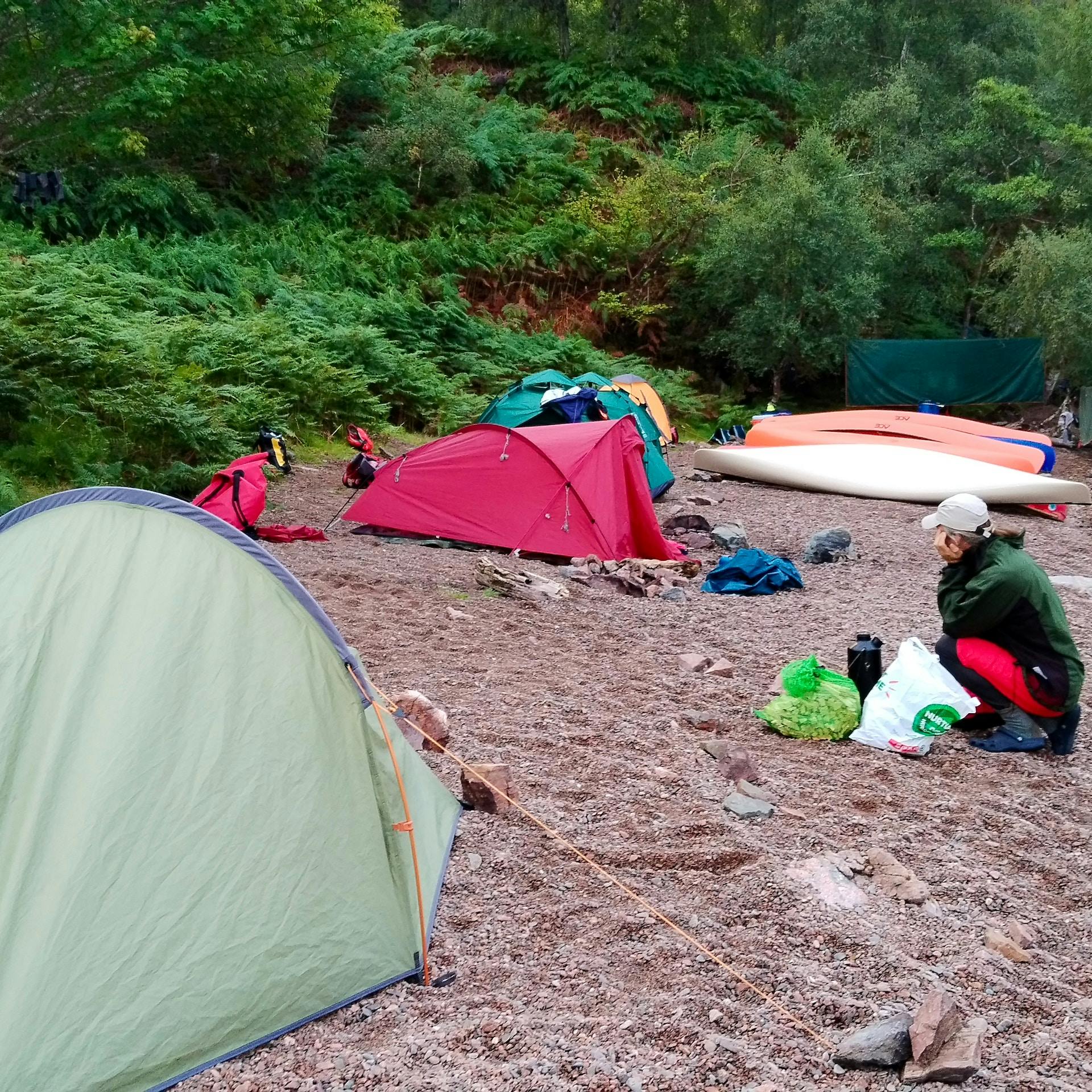
Now that you know where to camp in Scotland for free, let’s consider a few tips and best practices for wild camping in this country.
Plan for Midges
Scotland's notorious midges, tiny flying insects known for their irritating bites, are prevalent during the summer months. If you’re going to be summer camping in Scotland, you need to come prepared for these pests.
To make your camping experience more enjoyable, pack midge repellent and consider investing in a midge net that covers your head. By taking these precautions, you can minimize discomfort and itching caused by midge bites.
Weather-Proof Your Gear
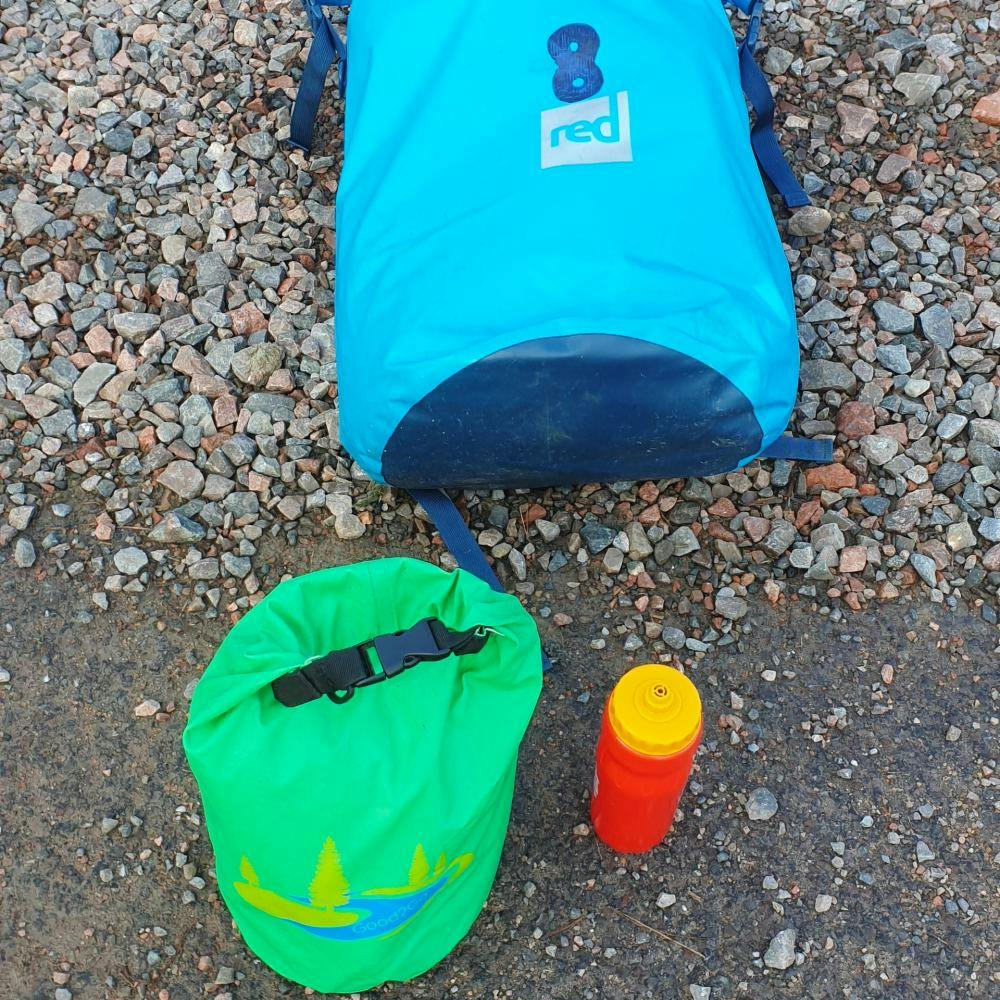
Scotland's weather can be famously unpredictable, so it's crucial to invest in high-quality waterproof gear.
A reliable rain jacket, waterproof pants, and waterproof boots are essential items. Additionally, consider using dry bags or waterproof stuff sacks to keep your gear dry, as wet equipment can make your camping trip considerably less enjoyable.
Emergency Communication
In remote areas of Scotland, mobile phone reception can be unreliable or non-existent. To ensure your safety, especially in emergencies, carry an emergency communication device like a satellite phone or a Personal Locator Beacon (PLB).
These devices can be a lifeline when you're far from civilization.
Check for Deer Ticks
Some regions of Scotland may have deer ticks, which can carry Lyme disease. After your camping trip, carefully inspect your body for ticks.
If you find any, remove them promptly using proper tick-removal techniques to reduce the risk of disease transmission. This is something people often overlook when wild camping in Scotland.
Respect the Local Culture
Scotland is steeped in rich history and culture, and it's essential to be respectful of local customs and traditions. Engage with the local community in a friendly and considerate manner, appreciating the unique heritage of each area you visit.
Carry a Map and Compass
Although modern GPS devices are useful, always carry a traditional map and compass.
Scotland's terrain can be challenging to navigate, and technology can fail. A map and compass provide a reliable backup, helping you find your way in the event of navigation issues.
Tread Lightly
Minimize your environmental impact by staying on established paths and trails whenever possible. Avoid trampling fragile vegetation, particularly in ecologically sensitive areas, to preserve the natural beauty and integrity of Scotland's wilderness.
Prepare for River Crossings
In some areas of Scotland, you may need to cross rivers or streams during your camping adventure.
It's essential to have the necessary skills, equipment (such as waterproof bags to protect your gear), and knowledge of safe river-crossing techniques to ensure your safety and the integrity of your equipment.
Wildlife Safety
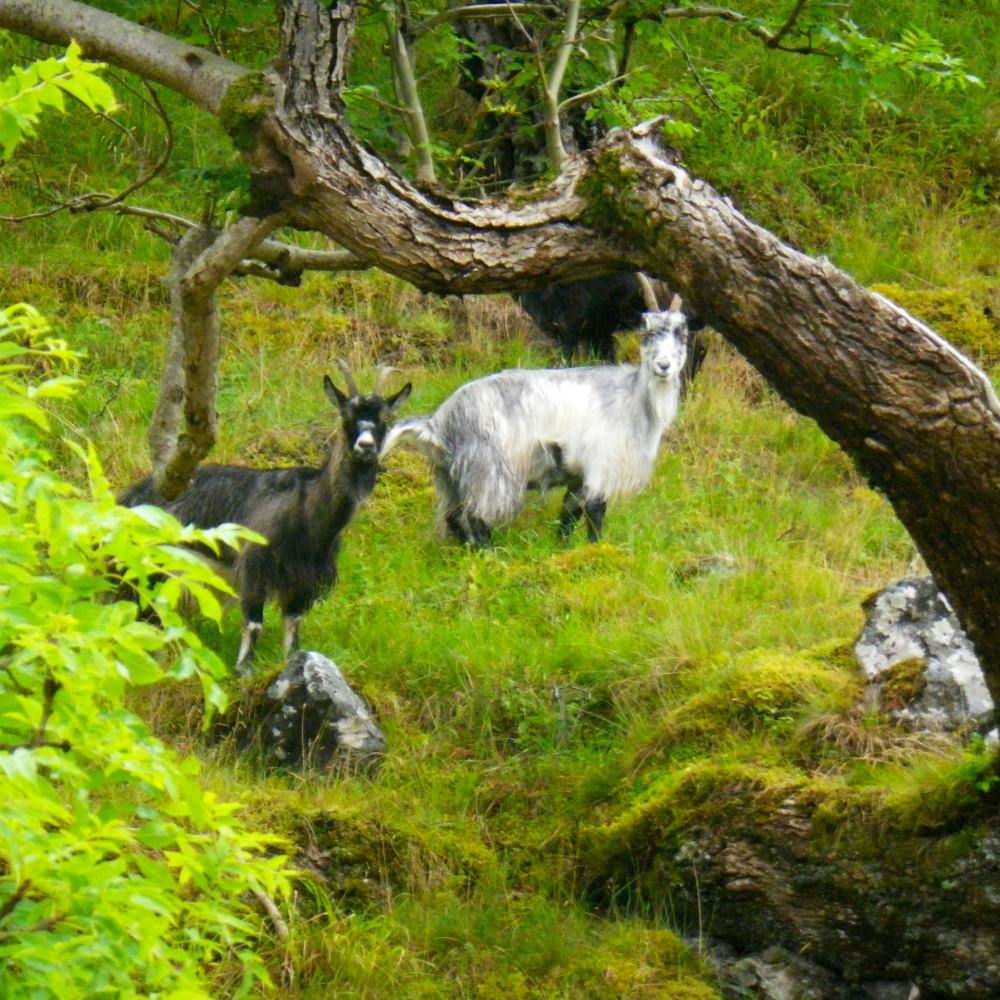
Familiarize yourself with the wildlife you might encounter in Scotland, including animals like red deer and wild goats.
Maintain a safe distance and never feed wildlife, as this can habituate them to human food, leading to potentially dangerous situations for both humans and animals.
Legal Considerations
Research and understand any specific local regulations or restrictions that may apply to your chosen camping location.
Some areas may have different rules, such as camping permits or seasonal limitations, so it's essential to be aware of and follow these regulations to have a smooth and enjoyable camping experience.
Local Seasonal Variations
Keep in mind that Scotland's different regions can present season-specific challenges and opportunities.
For example, winter camping may be possible in some areas but requires distinct equipment, skills, and knowledge. Always plan according to the specific season and location of your camping trip.
Conclusion
Wild camping in Scotland is a rewarding experience for anyone willing to explore the wilderness and find remote areas. As long as you’re prepared and understand the wild camping laws, you can freely enjoy this country’s magnificent nature.
Make sure you understand Scotland’s temperamental weather and always be well-equipped when you head out. With the right preparation, and a keen sense of adventure, wild camping in Scotland is the ultimate way to experience this country.
Scotland Wild Camping FAQs
Can I camp anywhere in Scotland?
No, you cannot camp anywhere in Scotland. While wild camping is allowed on most unenclosed land, you must still follow specific rules and respect the Scottish Outdoor Access Code.
Can you go wild camping and fishing in Scotland?
Yes, you can go wild camping and fishing in Scotland, but you should follow local regulations and obtain the necessary permits, if required, for fishing in specific areas.
Is wild camping in Scotland safe?
Wild camping in Scotland can be safe if you are well-prepared, follow safety guidelines, and practice responsible camping.
Are you allowed to camp along trails in Scotland?
Camping along trails in Scotland is generally allowed but may have specific regulations or restrictions in some areas.
Find your next adventure
Why Skyhook?
Join over 27,000 Skyhook adventurers who've used our platform to book directly with our vetted local guides, at local prices (we never markup).
Expert Local Guides
Experienced local guides, handpicked by us.
Best Prices
Never pay a markup on the local guide's price.
Exclusive Club
Earn loyalty rewards every time you travel.
Great Social Vibes
Small group tours provide a richer experience.
Stellar Feedback
Over 3,000 reviews, average of 4.9/5 stars.








